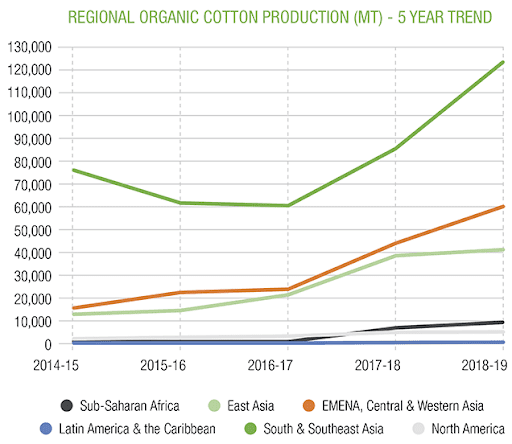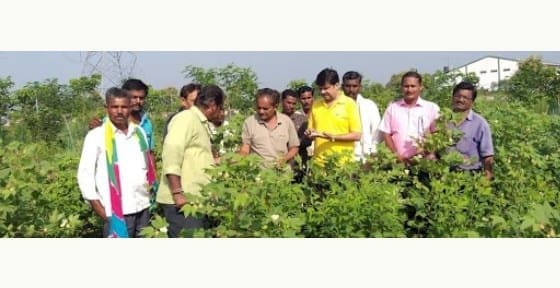Organic Cotton: Golden opportunity for India
Would you believe if I said, “There is a shortage of cotton in India?” You would immediately retort back with a curt reply, “You must be kidding”. You will most certainly corroborate your response with logical facts like
- India is the largest producer of cotton
- India is amongst Top 3 exporter of cotton
- Since last many years, India has remained a ‘Cotton surplus’ Top consumer of cotton
- India is most likely to have it’s highest carry over stock this year
While all of these are true, we fail to realise “What does India’s Textile Industry actually need?” The fact remains that India is facing acute shortage of 2 types of cotton
- Organic cotton
- ELS cotton
Your obvious argument will be that India is the world’s largest supplier of organic cotton in the world. Close to 240,000 metric tons of global organic cotton were produced in 2019 and out of this India holds a 51 % share. The second position is occupied by China with a distant 17 %, followed by Kyrgyzstan and Turkey at 10 % each.
Growing Demand

-Source Textile Exchange
Data shows that the demand for organic cotton has seen exponential growth over the years. According to the Organic Trade Association, there has been 31% growth in the organic cotton industry in the past one year and it is expected to see a rise of 10% during 2021. The whole world is witnessing the remarkable benefits of the production of organic cotton, be it clothing demand or employment opportunities. Pre-COVID estimates showed that global organic cotton production will grow by a further 10 % by 202021. But things have changed drastically in 2020.
Shrinking Supply
Most of the countries were struggling to increase their market share in Organic cotton. The world started depending on India for sourcing Organic cotton. Till 2019-20, India ‘used to’ grow about 5-6 million bales of Organic cotton. 50% of this was exported and the rest 50% was converted in value added products such as yarn and garments which were majorly exported. Both India and the world were comfortable with this arrangement till a Tsunami hit the Textile industry last year.
Tsunami hitting the Organic cotton industry
An investigation by the Global Organic Textile Standard (GOTS) identified 20,000 metric tonnes of cotton that was wrongly certified as organic. GOTS has since instructed its approved bodies to cancel all upstream transactions certificates based on these wrongly issued documents in order to prevent affected goods being sold with the GOTS label.
Effects of Tsunami
The effect was drastic and dramatic. Shipped/ unshipped cotton was under scrutiny hampering the supply chain, supply was choked, contracts were either cancelled or unhonoured, there was uncertainty and extraordinary delay in transaction certificates. In short, there was complete chaos amongst the stake holders. As a result, the premium of Organic certified cotton in India sky- rocketed by about 20%.
After effects of this Tsunami:
Most of the organic supply chains stand fractured and fragile following scrutiny and decertification. There will remain an element of doubt for all suppliers of cotton and value added products till they provide fool-proof documents and certificates.
Solution:
We need to build a robust and traceable supply chain for organic cotton. This Tsunami is an opportunity in disguise for stakeholders to build their “very own Organic cotton supply chain”.
Cottonguru® is assisting many such Textile Corporates and Brands to build robust, sustainable, traceable, and profitable supply chains. Cottonguru® undertakes projects for Organic, BCI and conventional cotton and contamination-controlled cotton for it’s customers based on professional turnkey basis backed by it’s expertise and experience of over 100 years.
Cottonguru’s inherent strength lies in it’s strong network of over 100,000 cotton farmers across India. With the ‘trust relationship’ built over years of association, training and handholding, Cottonguru® organises the farmers into clusters as per the need of the project.
3-Way benefit of Organic projects:
- Textile Industry: Projects undertaken by Cottonguru® have immensely benefited it’s customers in sourcing cotton of their choice with increase in productivity and profits. It is also useful in reducing carbon footprint and capturing the huge space in “Genuinely certified Organic product’ segment.
- Farmers: These projects have helped in increasing employment, decreasing the cost and improving the income of farmers.
- Environment: We all know that organic cotton is non-genetically engineered cotton grown without using hazardous chemicals like pesticides and fertilizers. Increase in organic production is directly proportional to the reduction of carbon emission in the atmosphere. Thus organic cotton can help mitigate climate change.
While many see these as a disadvantage, Cottonguru® utilises the following factors of Indian agriculture as an asset in Organic cotton projects with complete focus on the challenges of retention and sustainability:
- Small holder farmers
- Rainfed agriculture
- Availability of land
- Minimum use of pesticides (simply because many farmers cannot afford it)
- Climate change
Organic agriculture has the potential to help reduce carbon emissions, enhance soil fertility and improve climate resilience. Government can promote sustainable agriculture only by creating policies that integrate social, environmental, and economic interests of all stakeholders.
Therefore, Cottonguru® strongly recommends to the Government that:
- Organic agriculture must be declared as an effective strategy to reduce greenhouse gases and carbon emission.
- National mission on Organic Agriculture with research and extension services specific to organic production for climate resilient agriculture
- Special MSP for Organic cotton. This is most important to retain farmers in organic production.
Sustainable agriculture, management of natural resources and building robust supply chains is the key to prosperity for all stakeholders of the cotton textile industry.
About the organisation (Cottonguru®):
Cottonguru® is the leader in agriculture and textile advisory services across the country. It is in cotton industry since 1903 and has strived hard to reach this leading position. It has vast experience of working with the smallest of farmers and topmost consumers, DNA of technical and Marketing expertise and impeccable Brand image has given it a clear edge over our competitors. Cottonguru® wishes to and will continue to contribute to the value addition of cotton and agriculture in every possible manner.
Change is the only thing that is constant in the world. Cottonguru® Group has survived for over 100 years uninterrupted overcoming all calamities mainly because of deep rooted ethical values and ability to adapt to the changes. With a unique blend of tradition and technology, we have reached the coveted stage of “Think Cotton – Think Cottonguru®”
Core Purpose and Mission
The company runs on clear mission to assist farmers in improving yield and quality. It strives to help cotton users in locating regular sources of sustainable and contamination-free cotton at nominal prices. It aims to prevent the arbitrary use of plastic and paper objects and replace it with cotton-based products which are ‘natural, eco-friendly renewable resource’ (E. g. cotton handkerchief v/s tissue paper, cotton bags v/s plastic or paper bags) thereby helping save the environment.
Vision
Unlocking the socio-economic potential of agriculture for global prosperity.
By:
Manish Daga

